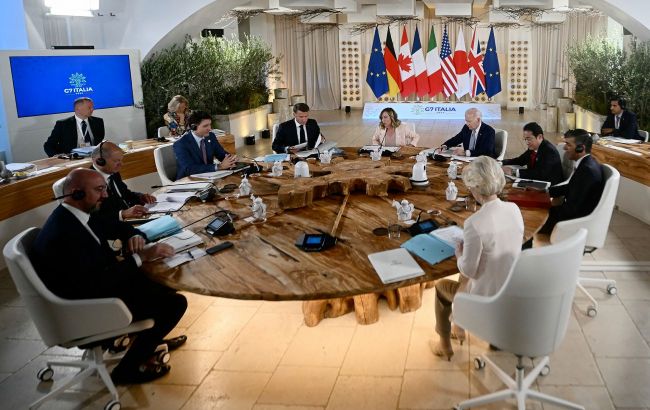Saudi Arabia threatened G7 with selling European debt over confiscation of Russian assets
 G7 leaders' summit in Italy, June 2024 (photo: Getty Images)
G7 leaders' summit in Italy, June 2024 (photo: Getty Images)
At the beginning of 2024, Saudi Arabia privately hinted that it might sell some European debt holdings if the Group of Seven decided to confiscate nearly $300 billion in frozen Russian assets, according to Bloomberg.
According to agency sources, the Saudis specifically mentioned debt issued by the French Treasury.
In May and June, the G7 explored various options for using the frozen funds of the Russian central bank for Ukraine's benefit. Ultimately, the group decided not to touch the assets themselves but to use the profits generated from them, despite the US and the UK urging allies to consider bolder options, including confiscation. Some EU member countries opposed this idea, concerned that it might undermine the currency.
Bloomberg sources say Saudi Arabia's position likely influenced these countries' negative stance on seizing Russian assets.
Meanwhile, the Saudi Ministry of Finance, in response to the agency's inquiry, claims there were no such threats.
However, according to one of the journalists' interlocutors, Saudi Arabia's position changed after the G7 countries proposed a plan that did not involve expropriation of assets.
Sources indicated it remains unclear whether Saudi Arabia acted out of its interests - fearing that confiscation would set a precedent that could be used against other countries in the future - or solidarity with Russia.
Whatever the motives, Saudi Arabia's move underscores its growing influence on the global stage and the difficulties the G7 faces in garnering support for Ukraine from the so-called Global South in the face of Russian aggression, Bloomberg believes.
G-7 decision on Russian assets
At the summit in Italy in June, after months of discussions, G7 leaders agreed on a financial framework that would provide Ukraine with approximately $50 billion in new aid. The seven-member countries and the European Union agreed to offer loans that would be repaid from the profits generated from the blocked Russian funds, totalling around €260 billion, most of which are located in Europe.
Ukraine is expected to receive between €3 billion and €5 billion annually.
According to Valdis Dombrovskis, Vice President of the European Commission, Ukraine will likely receive the first tranche from the income of the frozen Russian assets by the end of the summer. This tranche will amount to €1.5 billion ($1.6 billion).
The US has not yet determined the amount of payments to Ukraine that will be made from the income of the frozen Russian assets.

